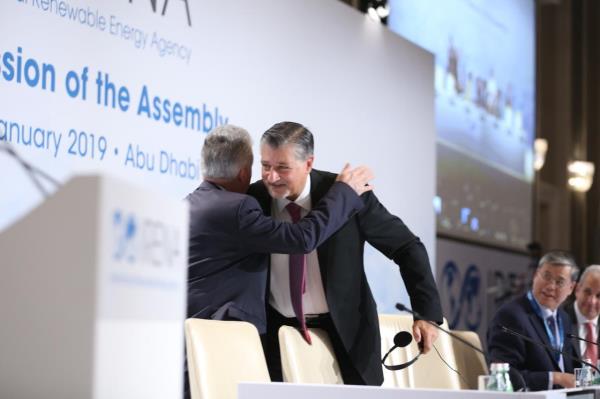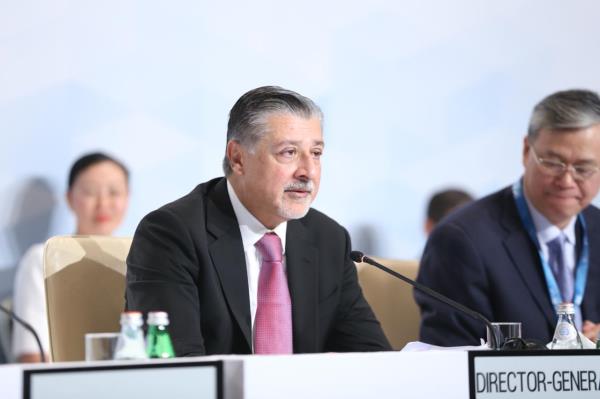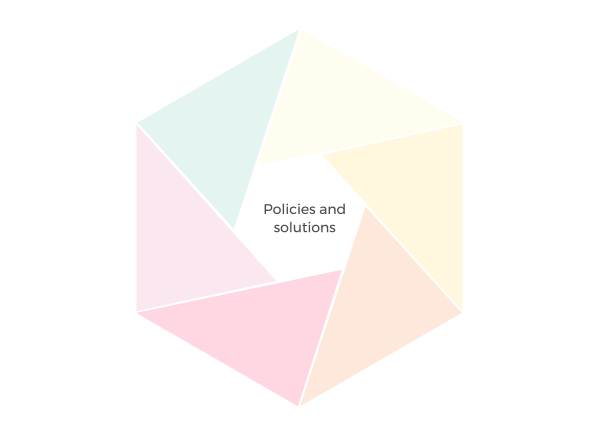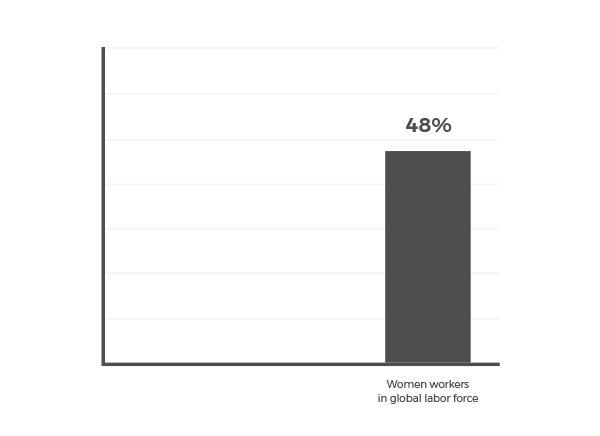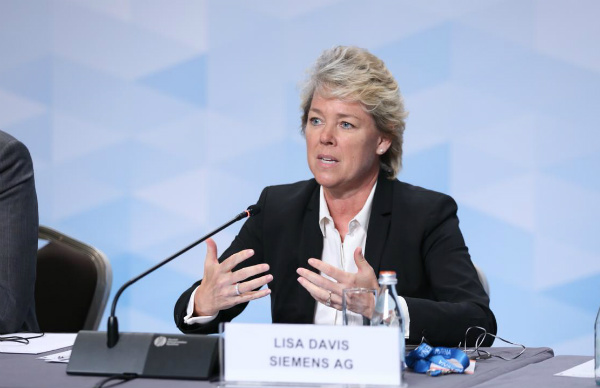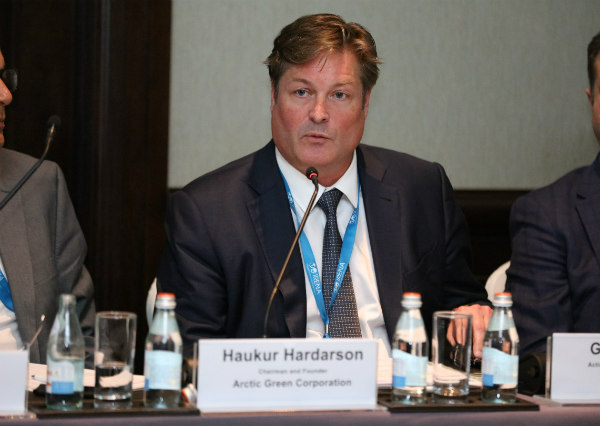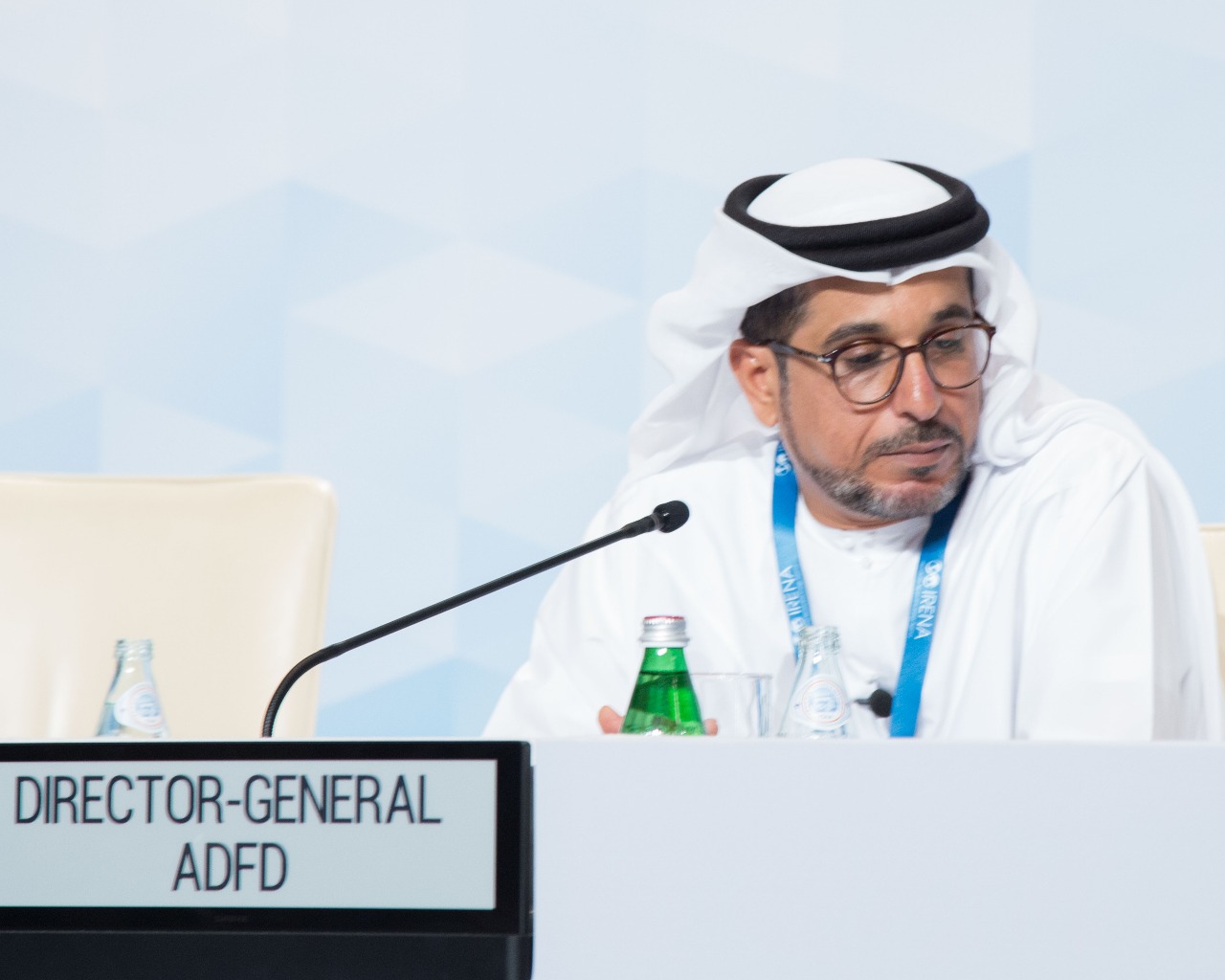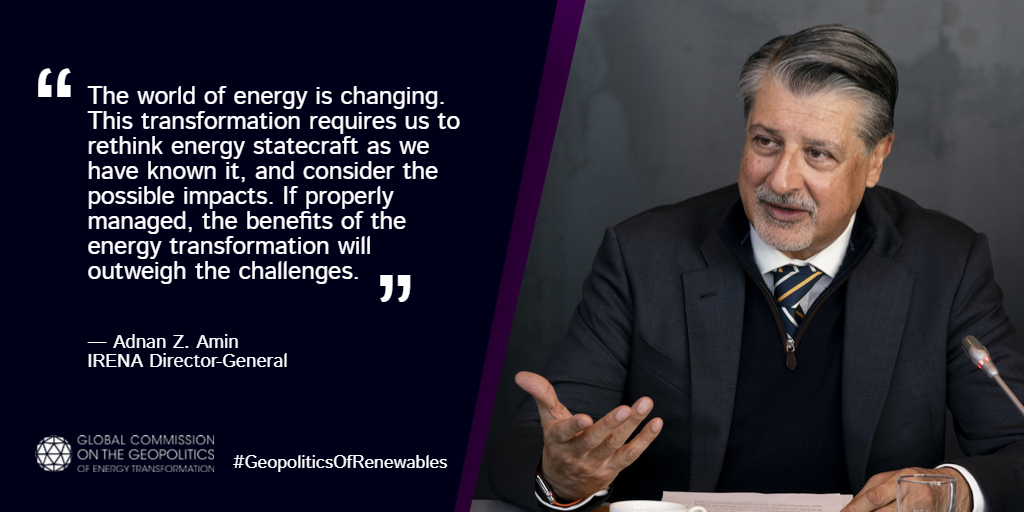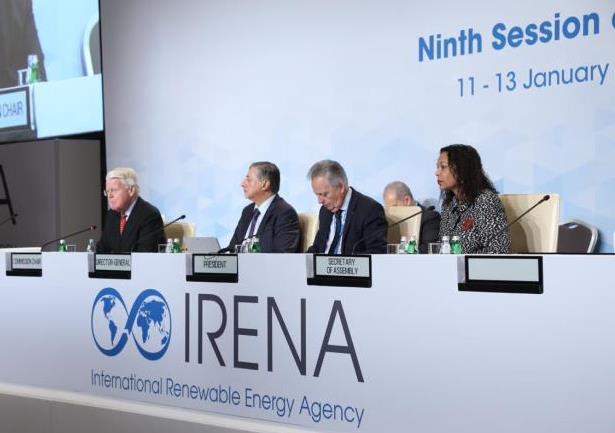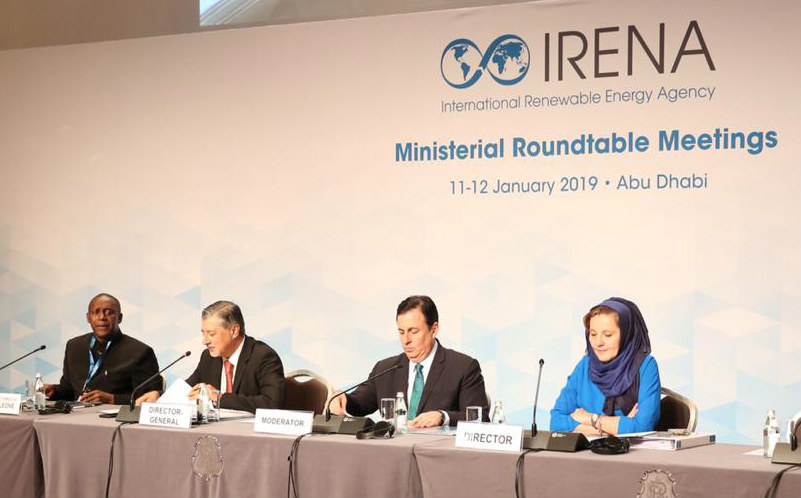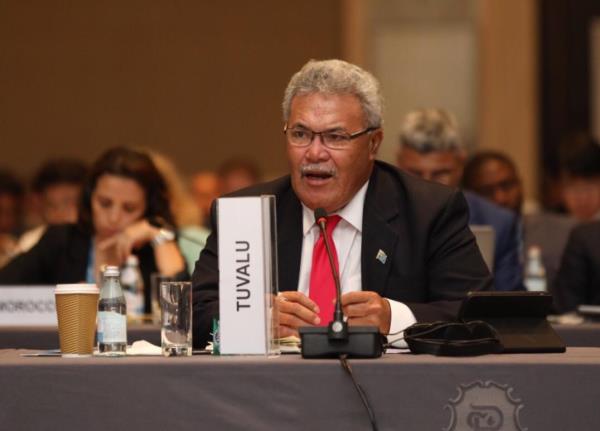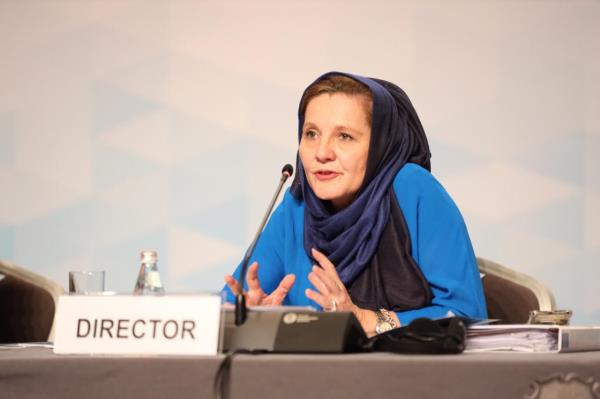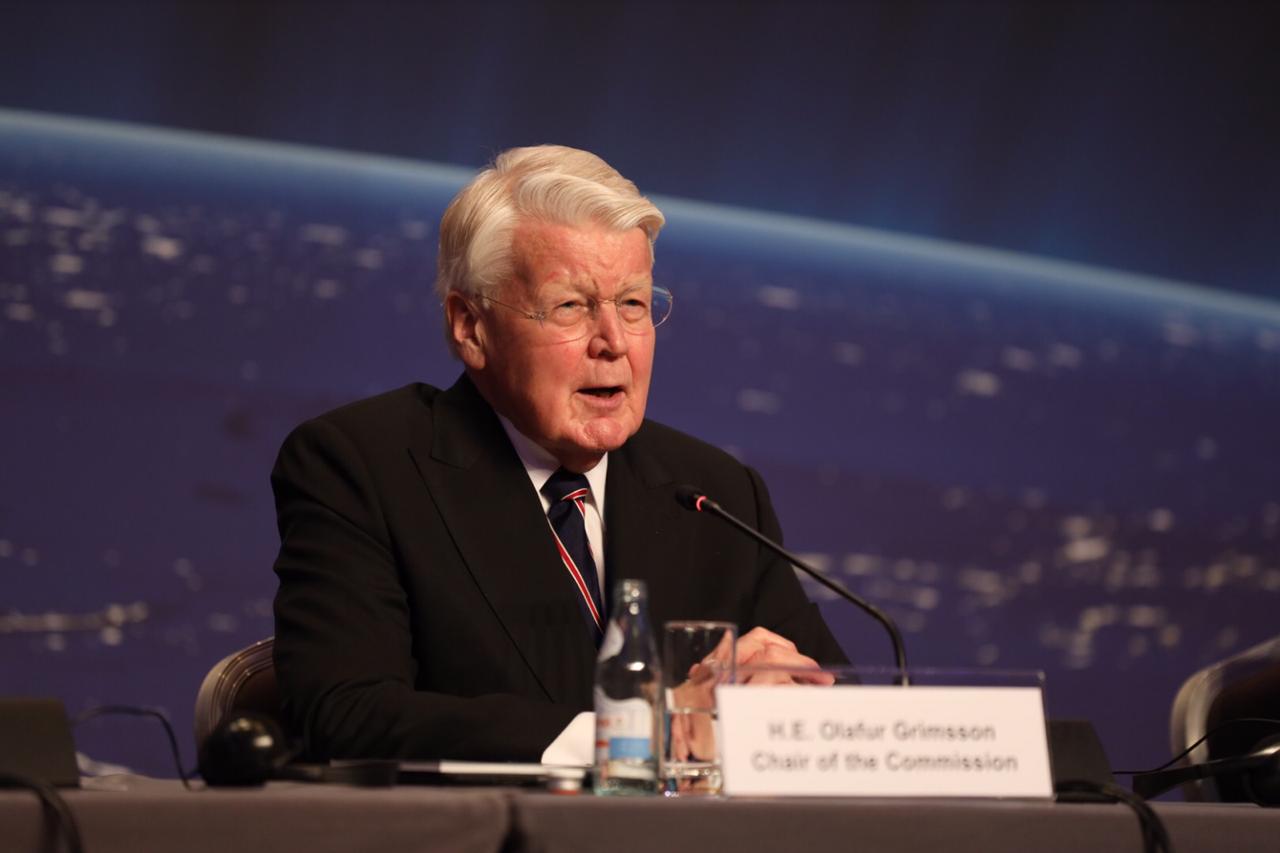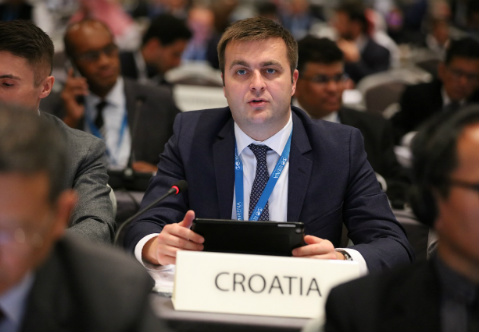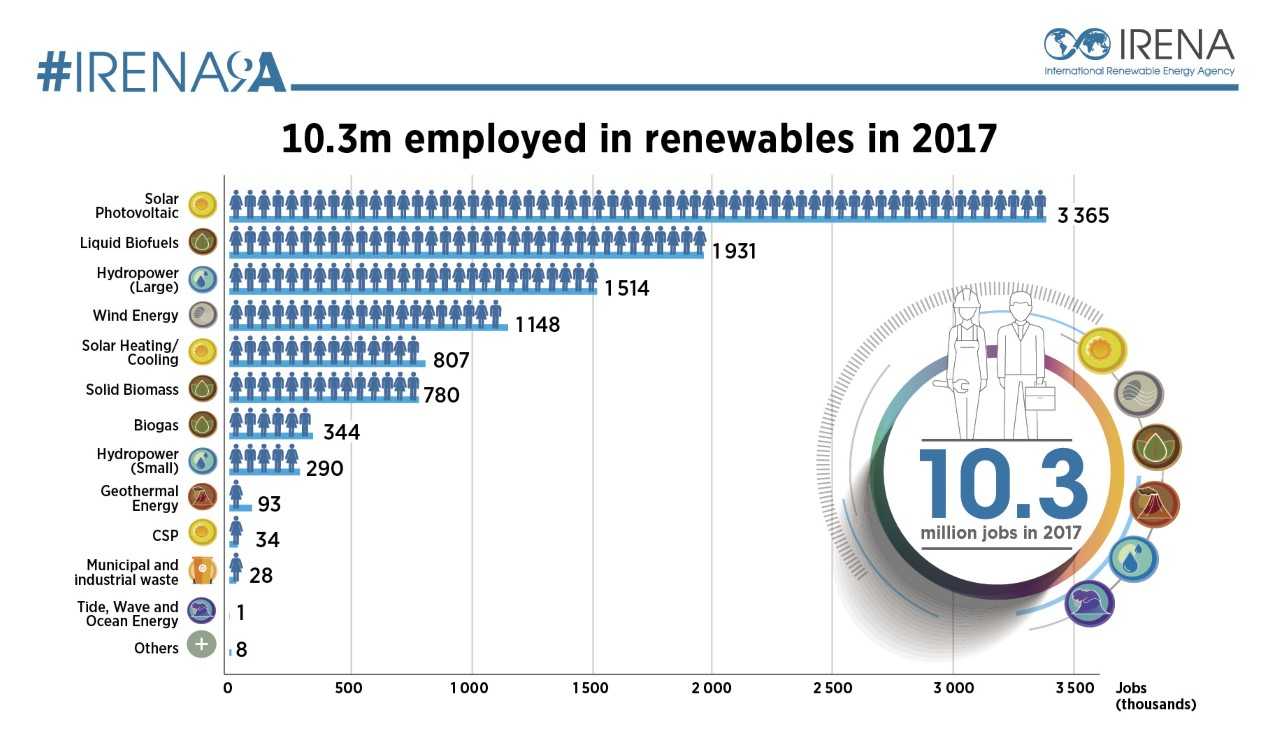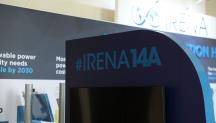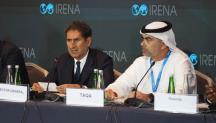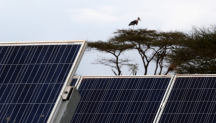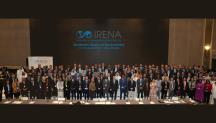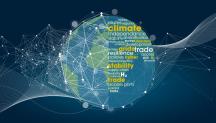
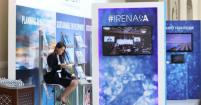
IRENA Ninth Assembly Live
Newsletter
1,200 delegates from more than 160 governments, the private sector and civil society are gathering to discuss key issues in the global energy transition and chart the way forward for the Agency against a backdrop of remarkable progress on deployment.
This live blog provides a rolling coverage of the Ninth Assembly Events as they happen.
Adnan Z. Amin offers words of support for his successor Mr. La Camera who will take office in April, outlining that he will take the helm of an organisation with world class workforce that is its greatest asset. Mr. Amin urges the new Director-General to make the most of an exciting opportunity for the Agency.
Delivering the concluding remarks of his last IRENA Assembly, he describes it as a very successful session and summarizes the key events, including the Ministerial on Innovation and Access and the geopolitics report launch:
"There is a conviction now that the worlds is changing. We launched a New World report and that indicates what the key factors of changing geopolitics will be."
In his final remarks, the Director General summarises his years at the Agency:
"Together, we have achieved more than we could have imagined ten years ago. I know I will miss IRENA family and the commitment to the advancement of renewable energy that unites as all."
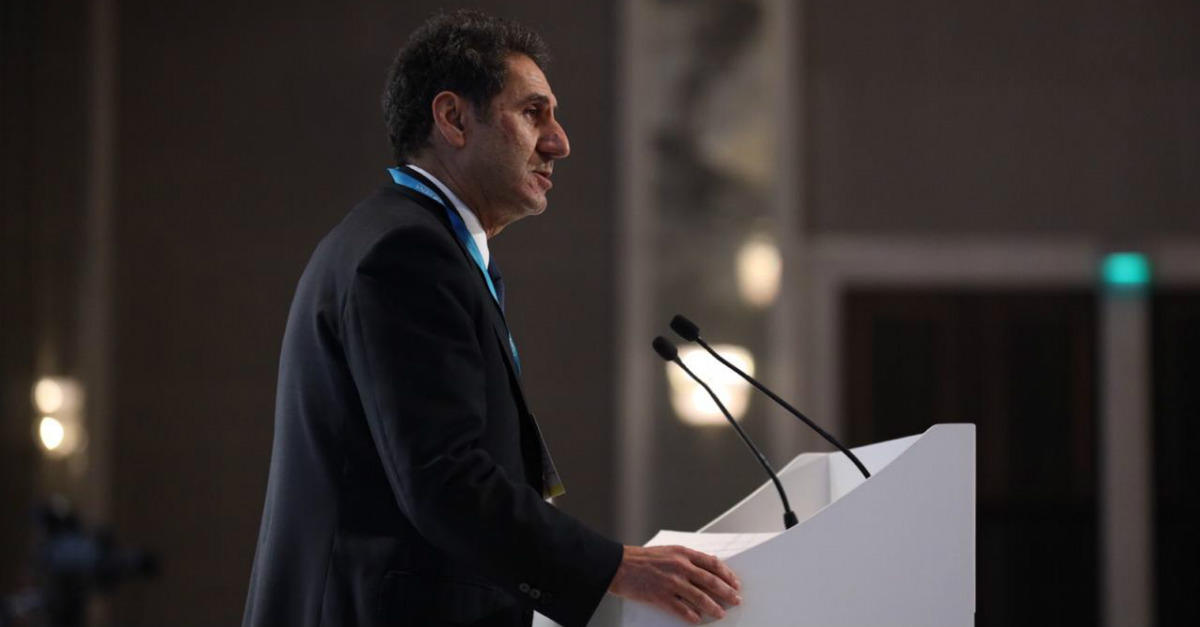
Francesco La Camera is appointed as new IRENA Director-General following a ballot at the Ninth Assembly. In his acceptance speech, Mr. La Camera assures the Assembly that they made the right decision, and pledges his full commitment to the work of IRENA. Read more
The Assembly has just adopted a decision to pay tribute to current Director-General Adnan Z. Amin for his outstanding contribution to the establishment, development and work of IRENA, and accorded Mr. Amin, at the conclusion of his tenure as the first Director-General of IRENA, the honorary title of Director-General Emeritus.
Members underline their appreciation of the Director General’s leadership and team building skills proven during his eight-year tenure and vision and commitment to making IRENA the success it is today. The growth of the Agency to 160 Members in January 2019 under Adnan's leadership is on unprecedented scale. The Agency successfully serves as the principal platform for international co-operation, a centre of excellence, and a repository of policy, technology, resource and financial knowledge on renewable energy.
"Dear friend, Adnan Amin, you have shown leadership all of these years. You have shown a strong mind and direct leadership can be coupled with a warm heart," said Francesco Starace.
Francesco Starace, CEO of Enel, says:
“Renewable energy was once referred to as alternative energy, and this hindered the development. Renewables were seen as unpredictable and too expensive. These perceptions prevented the diffusion of renewable energy all over the world. As of today, renewables speak for themselves. They are no longer referred to alternative energy and they are competitive on cost, they are reliable and they are a mainstream source of energy. This is widely thanks to the efforts of IRENA in what has been a decade of change.”
Director General of the EU Commission, Dominique Ristori gave credit to the Director General
"IRENA has reached all of its initial targets and became a global organization. I'd like to give credit to Adnan Amin not only for setting up a completely new organization and overcoming the barriers and challenges this entailed, but also for the ability to convince most of the countries in the world to join the Agency and become Members."
He continued underlining that leading IRENA in this first stage of its development also meant facing the difficulties related to convincing the world of the role and the urgency of renewable energy deployment. And this process has proven to be successful under the current leadership.
Egypt’s Minister of Energy and Renewables, H.E. Mohamed Shaker El Markabi, says:
“We all believe in the role of IRENA. Our country has long-standing relations with the Agency. In 2009 Egypt hosted a meeting to discuss the selection of the location of the host country. I would like to express my thanks to Mr. Amin for his role in encouraging the use of renewable energy during his tenure particularly in developing countries. Last month, we celebrated the report that was prepared by IRENA in consultation with our authorities and we hope IRENA will play its role in supporting the deployment of renewables on a bigger scale.”
Thorsten Herdan, Germany, expressed all his admiration and gratitude to the Director General Adnan Amin:
"Nobody can reach our goals alone. You have been driving this organization and your team in the best way, achievements of IRENA didn't happen by chance - but they come from hard work, your ambition and your vision and your living in the renewable energy".
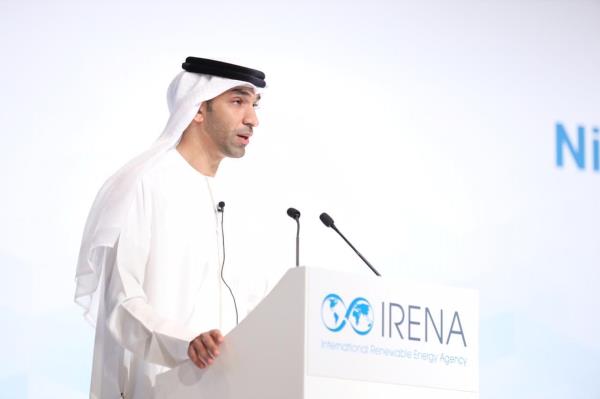
Dr Thani Al Zeyoudi, Minister of Climate Change on behalf of IRENA hosts, the UAE says: "IRENA’s progress has a special significance for the UAE. Not just because the UAE is the host country, but because the UAE’s bid to host them marked a significant moment in our own history. As its host country, the UAE has been proud to carry out the vision of IRENA. The Ministers notes that the UAE established the region’s first renewable energy targets, at a time when there was widespread doubt about the viability of renewables."
H.E Enele Sosene Sopoaga, Prime Minister of Tuvalu offers heartfelt remarks and tribute to the work of the outgoing Director-General.
“The fact that our people now enjoy 100 per cent access to energy, 26 per cent of which is from renewable energy sources, is a big A plus to the Director-General. If we save Tuvalu, we save the world.”
The Director General concluded emotionally thanking the IRENA staff for the support and dedication throughout his tenure.
During the speech, he underlined the Agency today is the major international co-operation framework for renewable energy. It is a globally recognised centre of excellence, a source of authoritative advice to countries and a catalyst for partnerships and concerted action. Its voice is heard at the leading global and regional settings, in corporate boardrooms and expert discussions. IRENA is indeed a story of success of international co-operation and multilateralism.
IRENA Director General Adnan Z. Amin reflects on the degree to which the conversation on renewable energy has evolved since he took office. Notably, the conversation about renewables is now based much more on the costs and benefits of their adoption than it was previously. He outlines that now, the global community understands that global GDP grows by one per cent by 2050 under our energy transition scenario and the benefits of renewables go way behind GDP, improving health, reducing air pollution and enabling climate mitigation.
"Eight years ago, the prevailing narrative on renewables was that of high costs, unreliability and an uncertain future. IRENA’s analysis and data has overcome this to set the course of a new discourse. From the obscurity of eight years ago, IRENA is now a voice of authority in the UN, a trusted multilateral partner in engagements such as with the G20 and G7, a regular contributor to initiatives such as the clean energy ministerial and a global player in the climate discussion.”
The session started with a video about IRENA's evolution over the past eight years and progress made in promoting renewable energy and advancing its deployment.
Welcome to the final day of the IRENA ninth Assembly. Today, the delegates have an opportunity to reminisce about the history of the organisation and its progress during the High-Level Segment "Taking Stock of Progress".
The discussion is slowly coming to an end. The panellists strongly support gender equality in renewable energy but what can be done to move from discussion to action? Enabling policies will help to achieve equal opportunities for women in the sector and a number of solutions can be provided for gender equality in the workplace.
“We talk about gender in energy transformation, it should be energy in gender transformation. Energy delivers on other development goals, and we won’t achieve the other goals without gender.” said Sheila Oparaocha.
Discussion continues with some strong statements from the panelists.
Gabriela Cuevas Barrón, the President of the IPU said "There is no easy way for women because rules are designed for men and world is designed for men - we need to change those rules, and with it, the world. Solidarity is a must. Sometimes we see more solidarity among men than among women. We need to understand that, that is the glass ceiling."
"In many of the societies, for woman, a day she is born is a bad day" said Harish Hande, "The most difficulty we get is from the society itself" he continued.
A very passionate speech from María Fernanda Suárez Londoño, Ministry of Mines and Energy, Colombia. "We need to move more from advocating to action" she said and underlined, based on her own example, than women themselves are biased - she herself left a very good job due to becoming a mother out of her own choice, believing she is more suited to take care of the kids than their father. Therefore, progress starts with women themselves. We need to share the care giving and allow men to be care givers as well.
"There is never a good timing when you are a women to go and break the glass ceiling. You have to act, involve the men in your life. Women always think they need to know it all to and still have much to learn. Men think they are always prepared. If we share the breadgiving but we do not share the caregiving, there will never be gender equality".
Rabia Ferroukhi, IRENA is providing the background to the discussion by describing the interesting results of the conducted by IRENA gender survey of over 1400 participants working in renewable energy. The just released gender report is based on the analysis of the survey results.
The discussion on innovation continues with inputs from session participants. The issue of acceleration of energy transformation in view of climate changes is becoming a topic in itself. On top of technological or market systems innovation, also political and administrative innovation will be required - this is the context we are embedded in. As is extreme weather - across the segments, we need to think about this when innovating. The progress is seen in transport, some in the building sector but industry is really a sector that needs to be re-shaped.
Meanwhile the session on Hydropower continues in the Plenary Hall.
Hydropower has a huge roll to play in the future energy mix, says IEA during session on the changing role of hydro in the energy transformation. IEA notes that under their future energy forecast, hydro will contribute more than 7000 terawatt hours of generation – by far the leading source of renewables. But for this to happen the world needs to reinvest and maintain existing hydro power plants. Without proper investment in upgrades there is a risk to hydro’s ability to meet that generation potential. Hydro will offer the flexibility needed to integrate higher shares of wind and solar into global grid as such being key to the transformation.
Lisa A. Davis, Chair and CEO of Siemens Corporation, stated that "competitive costs and worldwide availability has made renewable winning over other sources. The remote areas of Africa, Asia and Latin America often offer the best conditions for the implementation of renewable energy".
Continuing the scene setting part for the upcoming discussion, Francesco Starace, CEO of Enel Group said:
"There is a tsunami of technology evolution not only in the digital world but especially in the extraordinary continuous progress that science is having in all fronts"
Delegates are now watching the video from Innovation week 2018 event.
The Ministerial on Transformative Innovation has just begun in Room A2. The Director General Adnan Z. Amin is delivering opening remarks mentioning IRENA Innovation Week showcasing innovative solutions from around the world and explore how to use innovation to accelerate energy transformation. He also noted that innovation is the engine powering the global energy transformation, and that digitalisation and electrification and having a profound impact on global energy systems.
The Chair of the Commission of the Geopolitics of Energy Transformation, Olafur Grimsson, has joined the dialogue on geothermal energy and expressed the urgency for the world in adoption of geothermal energy in order to eliminate pollution, protect the environment and improve health quality for people all over the world.
Interesting insights of Iceland experience from Haukur Hardarson, Chairman and Founder of the Arctic Green Corporation. "The biggest energy challenge is heating & cooling cities - most energy goes to heating and the majority is for cities. Geothermal low-temperatures heating is the only renewable, base-load & profitable energy that can help reducing pollution."
Gurbuz Gonul, Acting Director, Country Support and Partnerships for IRENA, is launching now the new report on Accelerating geothermal heat adoption in the agri-food sector aims to increase awareness, share experiences and lessons, and provide recommendations for expanding geothermal heat use in the agri-food sector, including geothermal applications for food production and preservation.
Other two selected projects include:
Hinterland Electrification Programme in Guyana, put forward by the Ministry of Public Infrastructure. The project will install grid-connected solar PV systems in the hinterland regions to reduce fossil fuel consumption and increase the reliability of electricity supply. An estimated 34,700 people in the target areas will benefit and around 120 direct and indirect jobs are set to be created throughout the project lifecycle.
During the River Gee Mini-Hydropower, Liberia will develop a mini-hydro project to provide affordable, sustainable electricity to communities in the River Gee County. The project will directly contribute to achieving the national rural electrification goal of 35% by 2030 and will have a direct, transformative impact on the livelihoods of 30,000 people.
His Excellency Mohammed Saif Al Suwaidi, Director General of ADFD has just announced the IRENA/ADFD 6th cycle selected projects. These include:
Dapaong solar project in Togo is the first selected project in the 6th cycle. The Togolese Rural Electrification and Renewable Energies Agency will construct a 30 MW grid-connected solar PV plant that will improve energy security and bring clean, reliable power to around 700,000 households and small businesses. Local communities will benefit from greater access to drinking water, education and healthcare as well as job creation that prioritises women.
Mohammed Saif Al Suwaidi, Director General of ADFD will shortly announce the selected projects for the 6th funding cycle.
The delegates are invited to watch the video summarizing IRENA/ADFD selected projects over the years.
Paula Abreu Marques summarized the EU's commitment to advancing renewables in Africa. The first focus area is gender when the EU worked with 10 countries, nine of which are African, to support women and creating opportunities for women entrepreneurship. Second area is focus on clean energy for cooking in Africa to reduce pollution. in addition, creation of the Covenant of Mayors movement to increase energy efficiency and the use of renewable energy sources in Sub-Saharan Africa.
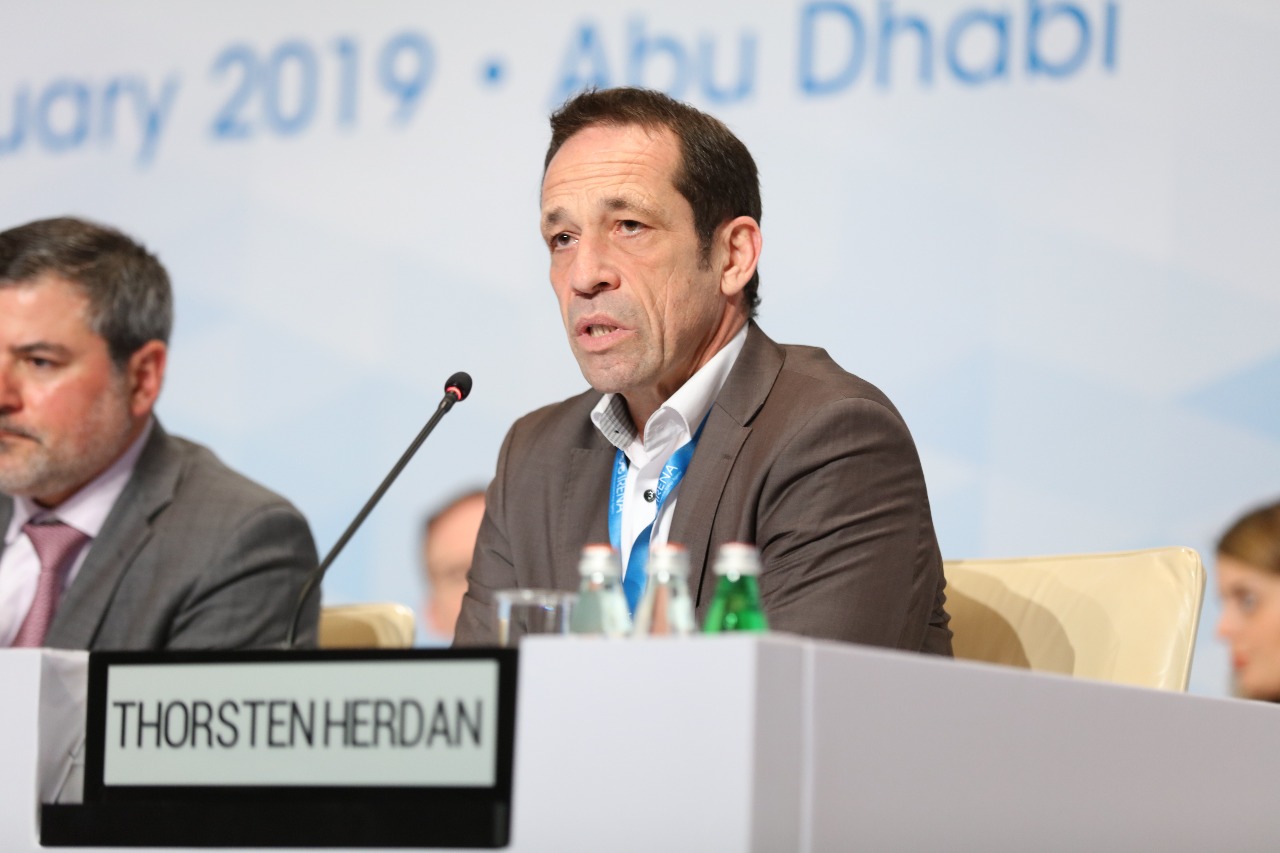
Thorsten Herdan of Federal Ministry for Economic Affairs and Energy, Germany is giving examples of his country's approach to fair energy transition. Germany took the decision that all the new power plants were to be built under a broad participation of everybody - taxpayers, companies, "we decided not exclude people but to involve them more with feed-in tariffs".
"Designing robust industrial policy framework will allow countries to take the full advantage of the energy transition" said Rabia Ferroukhi, IRENA, while summarizing agency's work on socio-economic benefits. She added that a fair and just energy transition when really nobody is left behind is of major importance.
See the summary of the upcoming report on Measuring the socio-economic footprint of energy transition with focus on the role of supply chains.
The session on the Socio-economic Benefits of the Energy Transition has just started. See IRENA's work on benefits and related publications.
Adnan Z. Amin is delivering the Closing Remarks to the session on the geopolitics of energy transformation summarizing countries' interventions. "No country is an island" said the Director General strengthening the message that the successful accelerated energy transformation and reaping all its benefits requires cooperation between states.
Germany, Norway and UAE supported the work of the Commission.
Peter Fischer, German Ambassador to the United Arab Emirates and Permanent Representative to IRENA, underlined that the report will alter the relations between states and bring out new challenges in global politics. The transformation driven by renewables will require a high degree of confidence and trust among nations, well regulated markets and rules based cooperation.
Hans Olav Ibrekk, Norwegian Ministry of Foreign Affairs, mentioned we will see new leaders emerging, and new actors in the process. The transformation will also change the energy statecraft - countries will be more interconnected through electricity grids and will have to work together. Bilateral cooperation will be key. The environmental and socio-economic benefits of the energy transformation will outweigh the challenges.
Dr. Nawal Al-Hosany, Permanent Representative to IRENA, underlined immediate action from policy makers to capitalise on benefits and address the challenges is required.The Chair underlined that this is the very first attempt to outline the new geopolitical structures. The Commission is confident the report is advanced enough to become the basis of further discussions on what this energy transformation will bring and how 'A New World' will emerge.
He also urged the IRENA Assembly to take the report back to their capitals with a sense of optimism about the possibility of a new world – a new and positive world. “Countries may gain, for the first time in human history, full energy independence. These countries, cities and people will become their own masters.” Grimsson notes that the report represents a first attempt anywhere in the world, from either political, business or academic community to outline the implications of these new geopolitical structures.
"New energy leaders are already emerging", says Director-General Adnan Amin in outlining the findings from the Geopolitics report.
“In particular, those that lead in clean technology and investments stand to gain the most from energy transformation. We are very quickly, moving away from energy geopolitics characterized by scarcity and conflict. To an energy future built on abundance and peace.”
Chair of the Commission on the Geopolitics of Energy Transformation, Olafur Grimsson, was interviewd by IRENA yesterday and is now delivering the opening remarks on geopolitics of renewables to a room full of delegates.
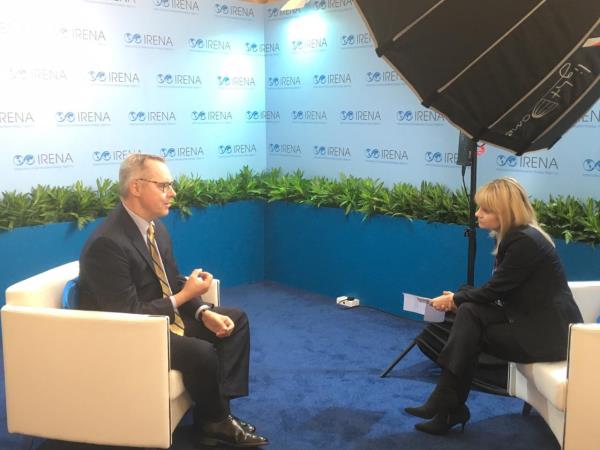
Interviews with delegates to the ninth IRENA Assembly are taking place in the media corner throughout the day.
Find them all on YouTube
The first day of the ninth Assembly has come to a close and ended with an affirmation of the Annual Report at the Plenary. The Energy Access Ministerial attracted a lot of participants who witnessed a vivid discussion on the needs of rural communities, potential solutions and needed investments, moderated by John Defterios, CNN.
In the wrap up of today, we cannot forget to mention the launch of the new geopolitics report 'A New World' showing how the global energy transformation driven by renewables will alter the global distribution of power, relations between states, risks of conflict, and the social, economic and environmental drivers of geopolitical instability.
Read the Press Release and freshly released Forbes article
Rabia Ferroukhi, Acting-Director at IRENA offers closing remarks in what has been a direct and frank energy access ministerial discussion, saying that the room is filled with many different actors all in of whom are in possession of the necessary tools to influence the development and deployment of renewables. But as an economist, one dimension is missing from the global discourse on a just transition,, says Ferroukhi, which is a better and fairer distribution of wealth.
Director-General Adnan Z. Amin continues the theme of offering perspectives, saying we have all the solutions – the problem in energy access, is with the donors.
H.E. Enele Sosene Sopoaga, Prime Minister of Tuvalu underscores how important it is for the state to support its citizens with the cost of electricity. If they moved to commercial rates for electricity in Tuvalu there is no way the people of the country would be able to afford to pay for it, he said. “The cost of imported diesel fuel is just too much to pass on. Renewable energy is the way to move forward to address climate change and to build a more sustainable energy mix.”
Impassioned intervention from Harish Handle on IRENA’s Ministerial roundtable on access, highlighting the presence of an emerging disparity between the cost of borrowing for the world’s rich and the world’s poor. He said developing countries and their citizens need long term financing solutions at much more competitive rates to bring down barriers and promote energy. The poor should not pay more for their financing, than the rich.
African Development Bank’s Amadou Hott, Vice-President, Power, Energy, Climate and Green Growth, says the risk profile of borrowers in developing countries still adversely affects their cost of borrowing. He hightlights that AFDB works with commercial banks to reduce the cost of borrowing and extend repayment periods, in some cases from 18 months up to between 5 or 7 years.
The world is steadily progressing towards universal access to electricity and the current technologies and the solutions can dramatically accelerate the the process.
Today, IRENA released a brief which takes stock of the opportunity at hand – detailing the dynamism and the innovations in the off-grid renewable energy sector. The brief highlights the latest trends and advances, including innovations in delivery and financing models. It also discusses the policy and regulatory measures governments are taking to harness the potential of off-grid renewables to help meet the Sustainable Development Goals (SDGs) adopted by the United Nations in 2015, including the goal on energy, SDG7.
'It's not only about investing money but it's about feasible solutions for e.g. clean cooking. I want to come back in ten years and see a better situation for women and people in this rural areas" the Special Representative for Energy in Africa, B. Höhn stated. Read more about how off-grid renewable solutions facilitate life of many in rural areas in the IRENA's article on Empowering women in Nigeria with Solar Energy
Habiba Ali, CEO of Sosai Renewable Energies Company, one of the largest distributors of renewable energy in Nigeria stressed how much money is already spent for energy access in her country:
“We’re working with a company in America to develop a type of solar cooker where we can put a pay-as-go system.”
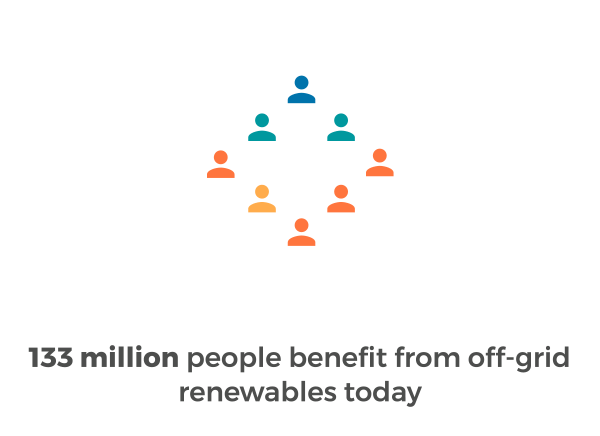
Hon. Kandeh Yumkella from Sierra Leone spoke about the importance of off-grid but also about the challenges of implementation and maintenance of any system in rural areas of Africa.
Rabia Ferroukhi of IRENA took stage to summarize off-grid solutions feasibility for rural communities.
"Food security and energy are strictly connected: 75% of the world poor live in rural areas and rely on agriculture. Renewable Energy solutions can be life saving in these contexts"
Watch the IOREC wrap up video to see the role decentralised renewable energy solutions can play in electrification strategies in the region and beyond, as well as the role of off-grid renewable energy in achieving several of the Sustainable Development Goals.
While closing the session, Commission Chair Olafur Grimsson underlined:
"We have been open, straightforward and pretty brutal in this report. Given the state of knowledge in the academic field, this report represents the first attempt globally, to provide some guidelines for a better understanding of this geopolitical change that is happening worldwide."
The Commission members are vividly discussing the views on the geopolitics of energy transformation. The discussion is moderated by John Defterios of CNN. The IRENA Director-General, Adnan Z. Amin said:
“We are going to see new leaders emerge who are driven by their ability to adapt to new technology. There will be a diffusion of power, as we move from a period of resource scarcity to abundance. The energy transformation’s benefits to the global community will outweigh the costs.” “We believe the relationship between states will change and that will impact the power balance between them. The discussions around oil, for one, are going to fundamentally change as the energy sector transforms.”
The UAE Representative to the Commission, Fatima Al-Foora Al Shamsi focused on the reality of her country. UAE is investing in the renewable energy for the sustainability and happiness of the country, she underlined and concluded that a 2050 Strategy is in force in the UAE: we call it a 50/50 Plan - 50% oil and 50% renewables. She added it was necessary to think what's the most important subject at the core of an effective energy transition. Considering the electrification process, cybersecurity has a major role. We might consider the formulation of international rule and further discussion on this matter.
Andris Piebalgs (Latvia) is currently talking about changing security of energy supply.
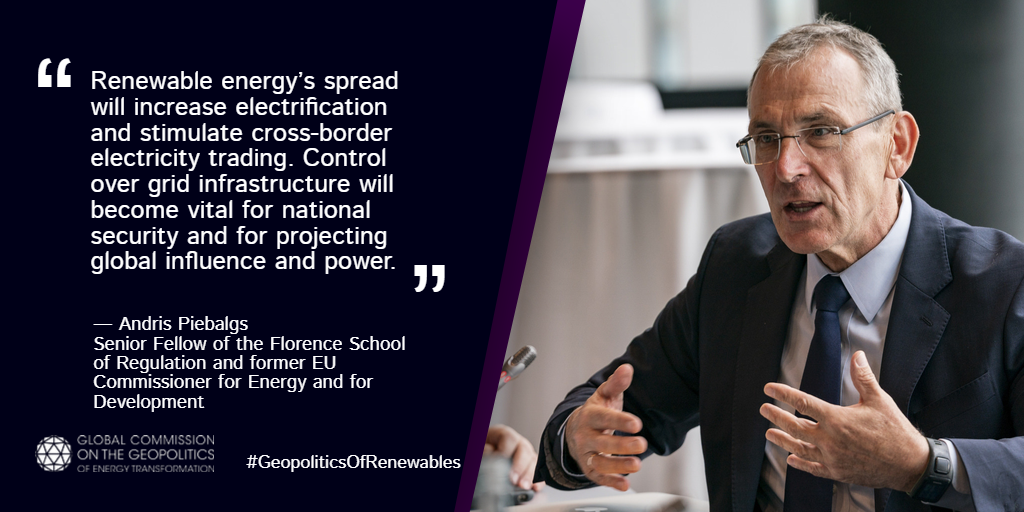
It's extraordinary to see the changes that we have seen in the global energy system. If we're talking about the advent of a major technological transformation, the pace of change is unprecedented. It is clear from discussions this morning that we all understand the existential threat posed by climate change. SIDS are clear that they are moving ahead with their energy transformation and are establishing momentum on renewables, but the rest of the world must do its part. But all of the evidence that we have seen about the positive economic case for renewables, and about the benefits that renewables brings, and has multiplier effects in social and economic terms. Today, there is a conviction that investment in renewables creates favourable macroeconomic conditions for the future. Countries in every setting are moving in this direction.
John Defterios of CNN has just begun the session on the Geopolitics of the Energy Transformation underlining the change taking place in today's world due to energy transformation.
"Solar power is at the centre of Croatia's investements in renewable energy," H.E. the Minister of Environment and Energy, Mr Tomislav Coric, highlighted how his country will further benefit from IRENA partnership with the European Union in the deployment of renewable projects.
The launch of the new report on the geopolitics of energy transformation, 'A New World' is soon starting in the Ministerial Hall, Room A2. The report is a result of a year of cooperation between Commissioners of the Global Commission of the Geopolitics of Energy Transformation, chaired by Olafur Ragnar Grímsson, the former president of Iceland.
Stay tuned for report preview and link to the full PDF.
Excellent cooperation between European Union and IRENA continues and was particularly visible during the negotiation of renewable energy targets for the region. As a consequence, by 2030 the EU will use 32% of renewable energy, twice the rate of today – it means large investment in the sector and an improvement of daily life of European citizens: clean air and new jobs. Looking beyond 2030, Europe expressed a will to be the first economy to go climate neutral by 2050. The contribution of IRENA has been underlined as extremely useful in demonstrating the target possible to achieve.
The Member Interventions are now continuing into the afternoon.
During the morning plenary session, one common theme kept running through the comments of high-level delegates: the energy transformation is happening and there is ample evidence of this in the countries of IRENA Members, but more needs to be done to accelerate it in line with Paris Agreement objectives. In order to reach the levels that the world needs, IRENA has a critical role to play in fostering international cooperation.
‘I’d like to take a moment to speak about Canada’s advancement of renewable energy to demonstrate why IRENA is important to Canada," started Mr Shawn Tupper, Associate Deputy Minister, Department of Natural Resources, Canada. Canada is today one of the fastest growing renewable energy producer. A national plan for renewable energy is in place, the commitment to invest is there.
"Canada is not only investing in renewables because of climate change, but because it is the opportunity of a lifetime. Jobs and climate change solutions are not in opposition – they go hand-in-hand,” he said.
"More than 500 000 jobs were added globally in the renewable energy sector 2017, with the total number of people employed in renewables surpassing 10 million for the first time" underlined IRENA Director-General, Adnan Z. Amin.
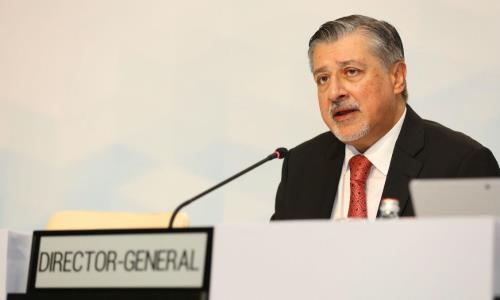
Opening the Ninth Session of the IRENA Assembly, the IRENA Director-General noted that in a few days, it will be ten years since the founding conference of IRENA. On 26 January 2009, 75 countries signed the Agency’s Statute, convinced that international collaboration would be the key to overcoming the major obstacles that this emerging sector was facing at the time.
Today, that foresight has proven true. The urgent imperatives of climate change, sustainable development and economic growth call for unprecedented changes to the global energy system, which require fundamental shifts in strategies, policies, investments and mindsets today.
The Director-General further noted that rapid cost declines, an increasingly conducive policy and economic environment are driving a shift from an era of centralised power and ownership to one of decentralisation and democratisation. Innovations in technology and business practices are further advancing these trends.
To reach the scale required to meet climate and development objectives, investment needs to be scaled-up. However, according to IRENA estimates the economic gains, including welfare benefits, would surpass the costs more than five-fold by 2050.
In concluding his remarks, the IRENA Director-General noted that “energy transformation is no longer an aspect of the distant future”. But the renewable energy revolution is only just beginning, and to in order to surmount its challenges and seize the opportunities, we must remain on the path of innovation, collaboration, and determination. In doing so, we can reach a renewables-based energy future that will underpin a sustainable and prosperous world.
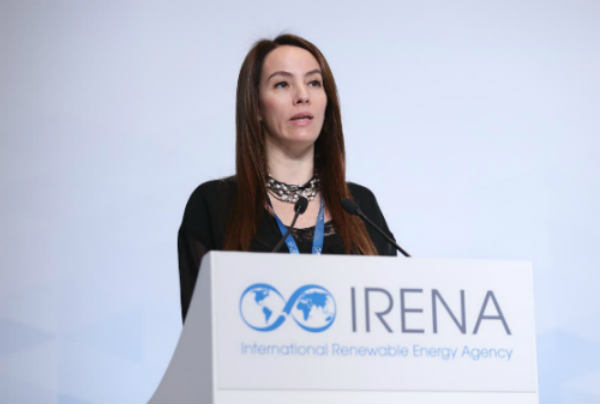
The President of the Inter-Parliamentary Union, Gabriela Cuevas Barron from Mexico summarized the Legislators Forum event. She called for action on speeding up the renewable energy deployment saying:
"There are 46 thousand parliamentarians all over the world. If we are truly committed to reach 2030 Agenda targets, we have only 11 years left. 11 years left to change the world."
IRENA Director General Adnan Z. Amin took the floor to address the Ninth Assembly participants, underlining the record participation of 125 Minsters this year, proving IRENA continues to provide a platform for the global energy transition.
Excellency Guillermo Monchecchi, the Uruguay Deputy Minister of Industry, Energy and Mining has just opened the Ninth session. He cordially welcomed IRENA new joiners since the last Assembly, including Canada, Costa Rica, Chad, Paraguay, Turkmenistan, Ukraine and the state in accession Brazil.
China is the President of the Ninth Assembly.
Welcome to Day 1 of the Ninth Session of the IRENA Assembly
More than 1,200 delegates and observers are now taking places in the Plenary Hall. Heads of State, Ministers, government officials, and representatives from the private sector, civil society and other international organisations gathered to reaffirm the global renewable energy agenda and make concrete steps to accelerate the global energy transition.
The Opening Session will begin shortly – stay tuned!
Thorsten Herdan thanked the IRENA Director General for the amazing work done so far and praised the Agency for its global leadership in the renewable energy. Renewable energy has proved to be economically feasible, viable and an excellent opportunity for jobs creation. This is the most important message that the organization has delivered to the world.
"We decided to title this report "A New World" because this is the reality: it has already happened and faster than we thought" said Commission Chair Olafur Grimsson, the former President of Iceland.
